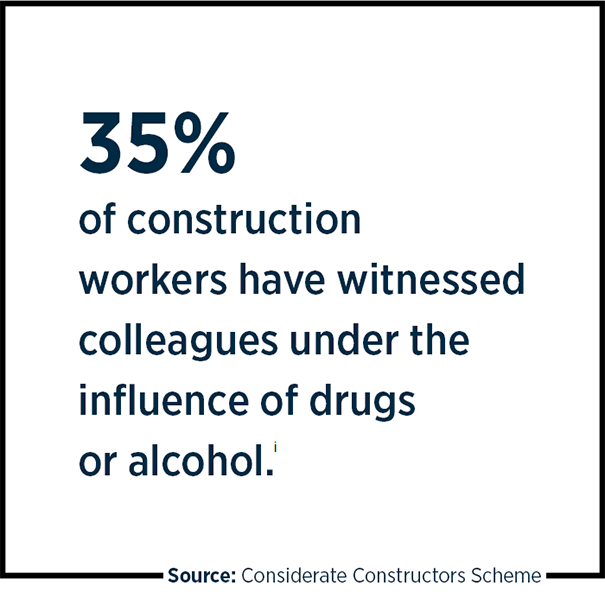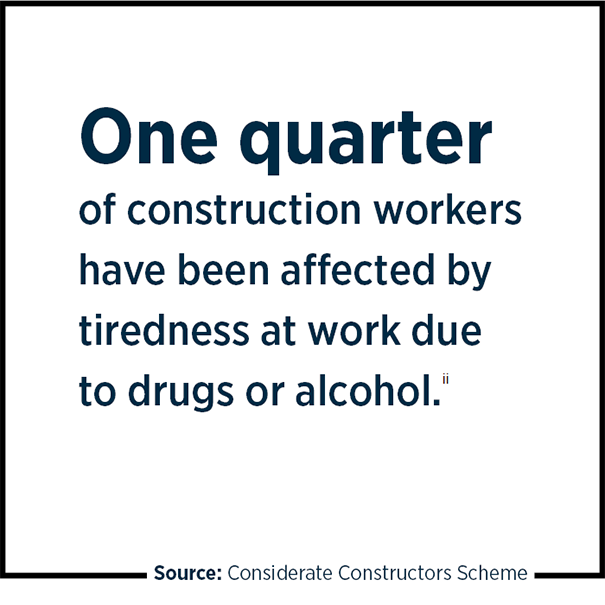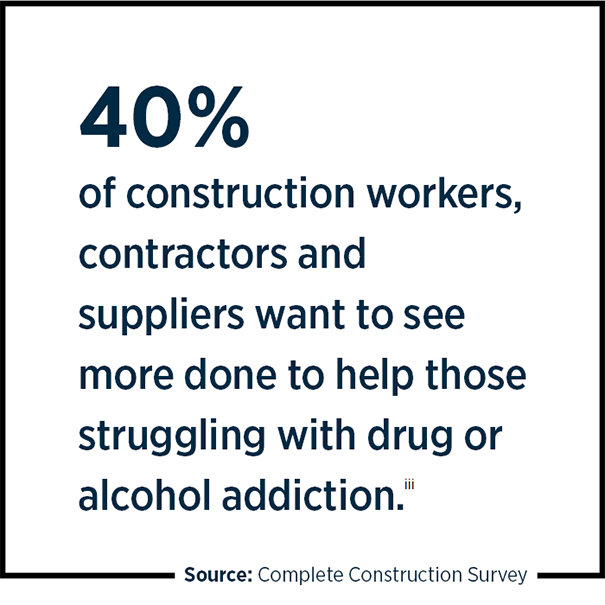
The impact of alcohol and drug misuse in the construction sector can go way beyond the individual worker—affecting their team, on-site safety, project deadlines and ultimately, the company’s bottom line. For employers, neglecting to recognise or act on substance abuse can also have significant implications for the business from a liability perspective.
Some of the key risks may be more obvious than others, but each highlights the need to take the issue seriously.

Performance and safety issues: Substance abuse can severely impair a construction worker’s judgment, reaction times and general performance on-site, leading to an increased risk of accidents, injuries and fatalities. For a sector that is already one of the most dangerous in terms of personal injury4, adding the misuse of alcohol or drugs can be lethal.
Decreased productivity and quality of work: Workers under the influence of drugs or alcohol are prone to reduced productivity, errors and poor quality of work. This can lead to project delays, cost overruns and damage to a company’s reputation.
Driving vehicles while impaired: If the worker is under the influence and in control of a vehicle on-site, this could lead to serious injury and/or damage to the vehicle and surrounding infrastructure. Driving their own vehicle to and from their place of work can also lead to accidents, along with the potential loss of their driving licence, or even prosecution—impacting the worker’s ability to get to and from their place of work. Firms also need to be aware of their responsibilities under the Corporate Manslaughter and Corporate Homicide Act 2007. If a driver is under the influence of drugs or alcohol whilst driving for work, their employer could be prosecuted under this Act and face an unlimited fine of up to £20m.
Impact on health and wellbeing: Substance abuse is often associated with mental health issues, and it’s been reported that one-third of construction workers suffer from elevated levels of anxiety such as anxiety and depression5. The physical nature of construction work can also make individuals vulnerable to chronic pain and the potential abuse of prescription painkillers, which can exacerbate the problem and lead to addiction.
Increased absenteeism and turnover: Workers struggling with substance abuse are more likely to be absent from work or arrive late, affecting productivity and overall project timelines. Additionally, these individuals may have higher turnover rates, leading to increased recruitment and training costs for employers. Almost half (48%) of construction workers admit to having taken time off work due to stress6 which is a recognised risk factor in substance addiction and relapse.
Worksite theft and damage: Substance abuse problems can contribute to unethical behaviour, including theft of equipment or materials, leading to financial losses for businesses. Additionally, impaired workers may cause damage to property, equipment or materials, further impacting a company’s bottom line.

What do employers need to know in terms of their liabilities?
Employers have a legal responsibility to look after employees’ safety and wellbeing as well as comply with workplace legislation.
The misuse of alcohol or drugs is illegal if:
- an employee under the influence of excess alcohol is knowingly allowed to work (Health and Safety at Work Act);
- controlled substances are produced, supplied or used on an employer’s premises (The Misuse of Drugs Act);
- drivers of road vehicles and transport system workers are under the influence of drugs while driving or unfit through drugs while working (The Road Traffic and the Transport and Works Act).
What can construction companies do to reduce their risk?
Establish a substance abuse policy
Implement a comprehensive substance abuse policy that clearly defines expectations and consequences for workers. This includes mandatory drug and alcohol testing during pre-employment screenings and random testing throughout employment. By enforcing a zero-tolerance policy, employers send a strong message that drug and alcohol misuse will not be tolerated on their worksites.
The Advisory, Conciliation and Arbitration Service (Acas) has produced a drugs misuse policy checklist that can help you form your workplace policy, including outlining the rules on the use of drugs and other substances at work, assurance of confidentiality and the provision of sick leave for agreed treatment.
Provide education and training
Invest in educating workers about the dangers of drug and alcohol misuse, including the impact on personal health, safety and job performance. Training can include information on recognising substance abuse signs, self-help resources and guidance on seeking assistance. By fostering awareness and understanding, employers can encourage a supportive environment and demonstrate their duty of care.

Offer mental health support
Substance abuse often stems from underlying mental health issues, so it’s important to offer access to mental health support services, such as counselling and employee assistance programmes to help workers cope with stress, anxiety and depression. This can help workers to address the root causes of their substance abuse and help them find healthier coping mechanisms. It can also be beneficial to have a trained mental-health first-aider present on-site. Firms and workers alike can also access resources from charities such as the Lighthouse Club and
Mates in Mind, who provide support specifically for the construction sector.
It’s important to consider that while the dismissal of workers found to be abusing drugs or alcohol may seem like the most appropriate solution, it can merely serve to direct them to another construction company where they could continue to put themselves and others in danger. Therefore, if practicable, paving the way for workers to receive support and education can be more favourable in the long run.
How can Gallagher help?
Gallagher provides a range of consultancy services that can be tailored for your company, including employee healthcare and protection, employee benefits and culture change. If you would like support in the area of employee substance misuse or employee mental health in general, please get in touch with our team. We are here to help you foster a safer and healthier construction environment.


